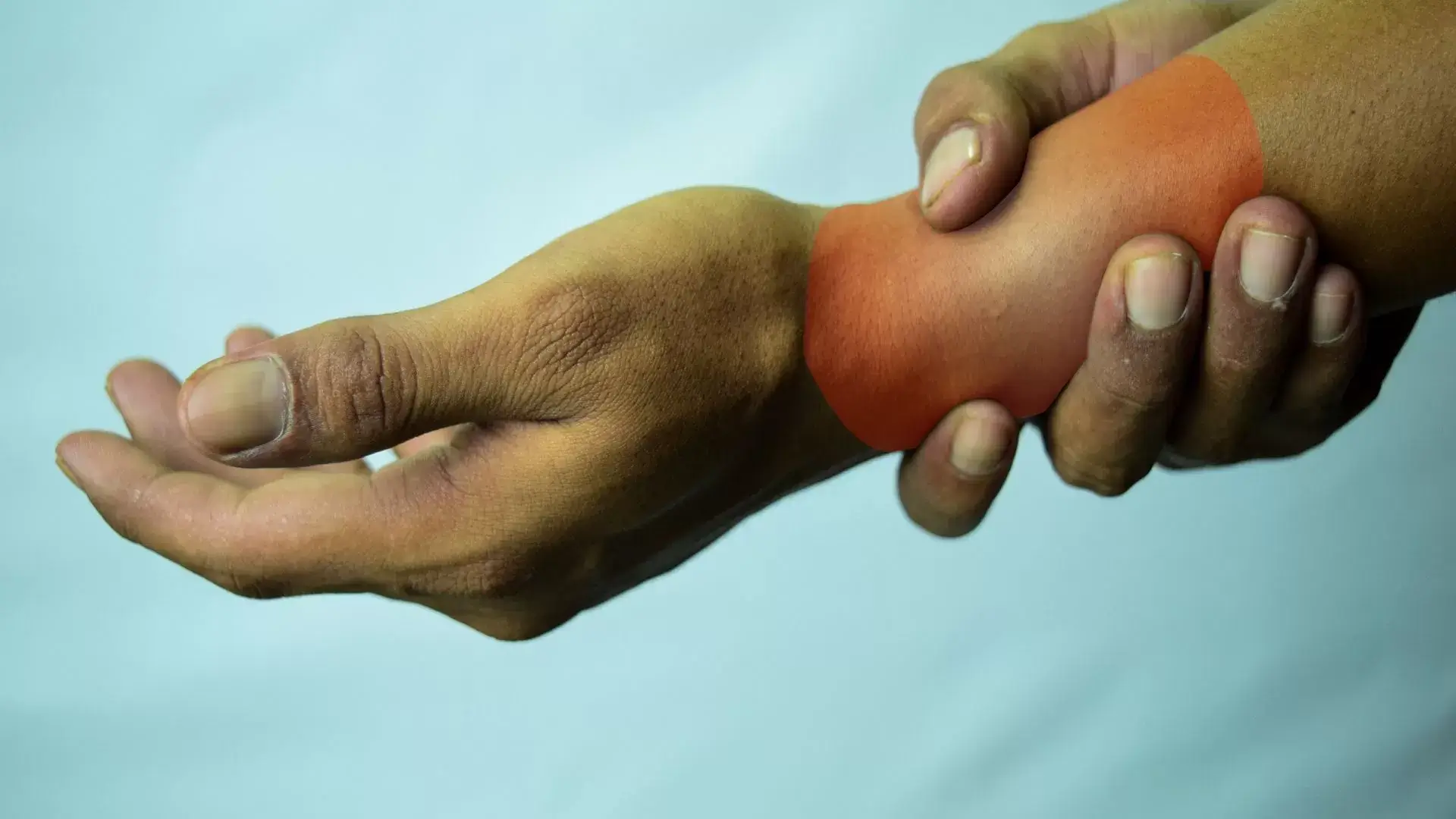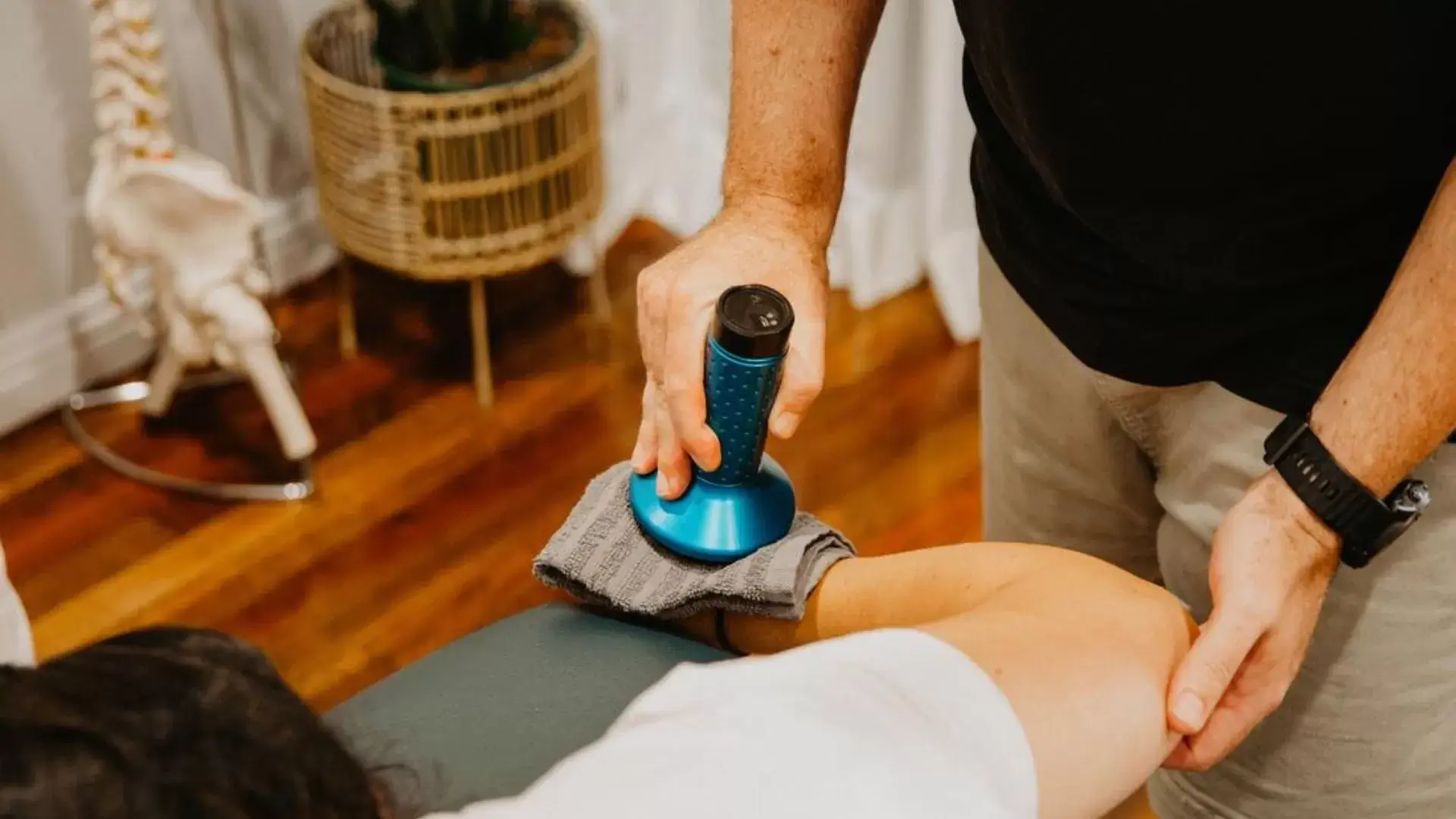We’re here to provide expert physiotherapy for Repetitive Strain Injury (RSI) in Mississauga. Our approach focuses on personalized treatment plans that address both symptoms and underlying causes, helping you regain strength and functionality. We utilize targeted exercises, ergonomic assessments, and pain management strategies tailored to your specific condition, be it carpal tunnel syndrome or tennis elbow. Our goal is to alleviate discomfort and empower you to prevent future injuries. If you’re keen to understand the full scope of solutions we offer, we can guide you through the details of our thorough care options.

At Mississauga Physio Chiro Clinic, we specialize in providing extensive physiotherapy and chiropractic services tailored to address the unique needs of individuals suffering from repetitive strain injuries (RSI). Our approach focuses on effective pain management and recovery strategies, particularly for those impacted by workplace injuries. We recognize how debilitating RSIs can be, and we’re committed to guiding our clients through their healing journey.
Our Expert Therapist in Mississauga employs a combination of techniques, including personalized stretching and strengthening exercises, to reduce inflammation and restore function. We also emphasize the importance of ergonomic practices, such as using an ergonomic keyboard, to prevent further injury. Additionally, we integrate occupational therapy principles into our services, ensuring a holistic approach to recovery.
Repetitive strain injuries (RSIs) can develop when we engage in repetitive motions or maintain awkward postures over extended periods, highlighting the importance of understanding their causes and contributing factors. These overuse injuries often arise from cumulative trauma disorders, where small, repetitive movements lead to considerable pain and dysfunction over time.
In many workplace settings, poor ergonomics play an essential role in the development of work-related musculoskeletal disorders. For instance, improper desk setups can exacerbate conditions like carpal tunnel syndrome, resulting in chronic pain and discomfort. Typing injuries are a common example, especially for those who spend hours at computers without proper breaks or adjustments.
We should be proactive in identifying these risk factors, as awareness is key to implementing effective prevention strategies. Simple adjustments, like enhancing our workstations or varying our tasks, can greatly reduce the likelihood of developing RSIs. By prioritizing our physical well-being and being mindful of our body mechanics, we can mitigate the impact of repetitive movements and foster a healthier work environment. Recognizing these causes empowers us to take action against potential injuries before they escalate.
Understanding the causes of repetitive strain injuries (RSIs) helps us recognize their symptoms early, allowing us to seek appropriate help before the discomfort becomes debilitating. Common symptoms of RSI include wrist pain, hand pain, and forearm pain, often accompanied by numbness or tingling in the fingers. We might also notice weakness or a loss of grip strength, which can greatly impact our daily activities and productivity.
It’s essential to pay attention to these warning signs. If we experience persistent discomfort or any combination of these symptoms, it’s vital to consult a healthcare professional. Ignoring these signals can lead to chronic pain and long-term issues that could have been prevented with timely intervention.
Moreover, we should evaluate our office ergonomics. Poor posture and inadequate workstation setups can exacerbate RSI symptoms. By adjusting our environment and recognizing when we need help, we can take proactive steps toward recovery. Engaging in physical therapy can be an effective way to address these issues, allowing us to regain strength and flexibility while preventing further injury. Let’s prioritize our health and well-being by staying vigilant and seeking help when needed.
Physiotherapy plays an essential role in our journey toward recovery from repetitive strain injuries (RSIs), offering tailored treatments that address both the symptoms and underlying causes of these conditions. Through a thorough assessment, we can identify specific issues like nerve compression, tennis elbow, or shoulder pain linked to our daily activities.
One of the key aspects of physiotherapy is developing a personalized treatment plan that may include manual therapy, therapeutic exercises, and massage therapy. These techniques help alleviate pain, improve mobility, and promote healing. Additionally, physiotherapists provide essential education on proper workstation setup, recommending tools like an ergonomic mouse or an adjustable chair to prevent further strain.
For those who’ve suffered from a manual labor injury or are experiencing chronic discomfort, physiotherapy offers anti-inflammatory treatment options that can greatly reduce swelling and pain. By focusing on both rehabilitation and prevention, we can regain strength and function, allowing us to return to our daily routines with confidence. Overall, physiotherapy empowers us to take control of our recovery from RSIs, ensuring a healthier, more sustainable approach to our well-being.

When dealing with RSI, it’s vital to conduct thorough evaluations and examinations to pinpoint the exact nature and extent of the injury. This process typically begins with a detailed patient history, allowing us to understand the onset of symptoms like neck pain, muscle fatigue, and swelling. We often explore the patient’s occupational activities to identify any patterns indicative of occupational overuse syndrome.
Next, we perform physical tests to gauge strength, range of motion, and tenderness in the affected areas. This hands-on evaluation helps us diagnose the specific type of repetitive strain injury, whether it be from postural strain or other factors. We might also utilize specialized tests to rule out other conditions and confirm our findings.
In addition to these diagnostic tests, we may recommend imaging studies if necessary, to obtain a clearer picture of the injury. Through careful evaluating and diagnosing, we can tailor a targeted treatment plan that addresses not only the symptoms but also the underlying causes of RSI. This extensive approach is vital for effective recovery and long-term prevention, ensuring we help our patients return to their daily activities pain-free.
Carpal Tunnel Syndrome (CTS) requires a multifaceted physiotherapy approach to alleviate symptoms and restore function effectively. We recognize that individuals suffering from CTS often experience debilitating pain, and our goal is to provide thorough support.
In our physiotherapy sessions, we focus on targeted exercises to strengthen the muscles in the hand and wrist, which can help alleviate the effects of repetitive strain injury. We also employ modalities like ultrasound or electrical stimulation to reduce inflammation and pain associated with tendinitis.
Wearing a wrist brace or hand splint can be beneficial, especially during activities that exacerbate symptoms, like typing on a keyboard. We’ll guide you on proper ergonomics to reduce keyboard strain and prevent further complications, such as elbow pain or trigger finger.
Additionally, if nerve decompression is necessary, we’ll collaborate with your healthcare team to guarantee a smooth shift back to normal activities. Recognizing that every case of CTS is unique, we tailor our physiotherapy strategies to meet your specific needs, fostering a supportive environment where healing can occur. Together, we can work towards regaining your strength and mobility.
Tennis elbow and golfer’s elbow can be effectively managed through a combination of targeted therapies and exercises designed to reduce pain and enhance recovery. Both conditions, known respectively as lateral epicondylitis and medial epicondylitis, are common forms of tendonitis resulting from repetitive strain injuries. In our physiotherapy sessions, we’ll focus on tailored rehabilitation strategies that address the specific needs of your injury.
We often start with pain relief techniques, such as ice therapy and ultrasound, to reduce inflammation. Then, we incorporate strength and flexibility exercises aimed at restoring function and preventing further injury. These exercises not only target the forearm muscles but also help mitigate related issues like smartphone thumb or other computer-related injuries.
Education plays a vital role in our approach, as we guide you on proper ergonomics and activity modifications to avoid exacerbating your condition. By engaging in a consistent physiotherapy regimen, we empower you to regain strength and mobility, ensuring a smoother recovery process. Together, we’ll work towards alleviating your pain and restoring your performance, so you can return to the activities you enjoy without limitations.
De Quervain’s tenosynovitis and trigger finger can noticeably impact daily activities, but our physiotherapy approach focuses on tailored interventions that alleviate pain and restore function. We recognize how frustrating it can be to manage these conditions, often associated with repetitive strain injury (RSI), affecting your ability to perform even simple tasks.
In our rehabilitation program, we prioritize manual therapy techniques that help reduce inflammation and improve mobility in the affected areas. We also incorporate specific stretching exercises designed to enhance flexibility and relieve tension in the tendons. Strengthening exercises play a vital role in our approach, as they help stabilize the wrist and fingers, promoting long-term recovery.
Additionally, we emphasize the importance of ergonomics in your daily environment. By evaluating and modifying your workspace or daily activities, we can considerably lessen strain on your hands and wrists, preventing further issues. Throughout this process, our empathetic team is dedicated to supporting you, ensuring that you regain full function and return to your daily activities with confidence. Together, we can effectively manage de Quervain’s tenosynovitis and trigger finger, paving the way for a pain-free future.

Repetitive strain injuries in the shoulder, neck, and upper extremities can greatly disrupt our daily lives, but through targeted physiotherapy, we can alleviate discomfort and restore functionality. Conditions such as golfer’s elbow and mouse arm are common examples of repetitive motion injuries that manifest from excessive writing strain or prolonged computer use. These repetitive stress injuries (RSI) can lead to chronic pain and disability if not addressed promptly.
In physiotherapy, we focus on understanding the specific nature of our repetitive strain injuries. By evaluating our movements and identifying contributing factors, we can develop tailored treatment plans. Techniques like manual therapy, strengthening exercises, and stretching routines help reduce pain and improve mobility. For those experiencing conditions like de Quervain’s tenosynovitis or other forms of tenosynovitis, targeted interventions can greatly enhance recovery.
We also recognize that musicians often face unique challenges, leading to musician’s injury. As we work together, we’ll not only address the immediate symptoms but also empower ourselves with strategies to prevent future injuries. Through a thorough approach, we can reclaim our daily activities and enhance our quality of life.
To effectively prevent and alleviate RSI at work, we must prioritize ergonomic adjustments that promote proper posture and reduce strain during daily tasks. By making simple changes to our workstations, we can greatly minimize the risk of developing conditions related to awkward postures and prolonged static positions.
For instance, adjusting our chairs and desks to guarantee our elbows are at a 90-degree angle can help reduce fine motor strain. Using supportive wrist rests can also alleviate RSI symptoms by minimizing forceful exertions. In environments like assembly lines or factory work, where repetitive movements are common, incorporating ergonomic tools can prevent RSI and related injuries, such as vibration syndrome.
It’s essential to evaluate our workspaces regularly, ensuring that they adapt to our needs and promote comfort. By recognizing the potential for strain and taking proactive measures, we can create a safer work environment that helps prevent RSI and alleviates symptoms for those already affected. Remember, investing time in ergonomic adjustments can lead to improved productivity and overall well-being, allowing us to work efficiently without the pain of repetitive strain injuries.
Incorporating key stretching and strengthening exercises into our recovery routine can greatly enhance our ability to manage and overcome the effects of RSI. For those of us dealing with conditions like golfer’s elbow or de Quervain’s tenosynovitis, targeted exercises can alleviate discomfort and promote healing. Stretching the forearm muscles helps improve flexibility, while strengthening exercises build resilience against injuries like tendinosis and bursitis.
We should focus on specific movements that address our unique needs. For instance, wrist flexor stretches can aid in cases of texter’s thumb and gamer’s thumb, while strengthening the grip can be beneficial for sports-related RSI. Additionally, individuals suffering from hand-arm vibration syndrome may find relief through exercises that enhance wrist stability and overall arm strength.
Incorporating these exercises into our daily routine not only aids in recovery but also acts as a preventive measure against future injuries, including musician’s injury and stenosing tenosynovitis. By committing to this practice, we empower ourselves to reclaim our physical well-being and minimize the impact of RSI on our daily lives.
Soft tissue and myofascial release techniques can play an essential role in alleviating the pain and discomfort associated with RSI, helping us restore mobility and function in our affected areas. These physiotherapy methods target the soft tissues, such as muscles and fascia, to relieve tension and enhance circulation.
For those of us dealing with golfer’s elbow, de Quervain’s tenosynovitis, texter’s thumb, or gamer’s thumb, soft tissue techniques can markedly reduce pain and improve our range of motion. Myofascial release focuses on releasing restrictions in the fascia, which can help alleviate the chronic discomfort often experienced in conditions like musician’s injury.
Effective pain management strategies for RSI are fundamental in helping us minimize discomfort and inflammation, allowing for a more functional and pain-free lifestyle. When dealing with conditions like golfer’s elbow, de Quervain’s tenosynovitis, or texter’s thumb, it’s essential to adopt a multifaceted approach.
Physiotherapy plays a pivotal role in our recovery. Through targeted exercises, we can strengthen affected areas and improve mobility, which is critical for reducing discomfort. Additionally, our physiotherapist might suggest modalities such as ultrasound or heat therapy to alleviate inflammation and promote healing.
For those who experience persistent pain, corticosteroid injections can provide temporary relief by directly addressing inflammation in the affected area. However, we should consider these options carefully, as they are not always a long-term solution.
In some cases, surgery for RSI may be necessary, especially if conservative methods fail to yield results. Ultimately, we need to remember that effective pain management is a journey. By combining physiotherapy with other strategies, we can work towards reducing discomfort and enhancing our overall quality of life.
To further enhance our recovery from repetitive strain injuries, focusing on improving posture and movement can greatly reduce the risk of re-injury and discomfort. When we adjust our posture, we can alleviate stress on our muscles and tendons, which is crucial for conditions like carpal tunnel syndrome (CTS), golfer’s elbow, and de Quervain’s tenosynovitis. By being mindful of our body mechanics while performing daily activities, we can minimize the effects of texter’s thumb and gamer’s thumb.
At our clinic located at 1834 Lakeshore Rd W unit 6C, Mississauga, ON L5J 1J7, we provide tailored exercises and ergonomic advice to help us maintain proper posture. Regularly taking breaks and integrating stretching routines into our daily schedule can also be beneficial. For those of us experiencing musician’s injuries or HAVS, understanding the importance of movement patterns is essential to our rehabilitation.
If we have questions or need guidance, we can reach out to our physiotherapy team. Together, we can develop effective strategies that not only improve our current condition but also protect us from future injuries. Let’s make these positive changes for a healthier, more resilient lifestyle.
Repetitive strain injuries (RSI) can greatly impact athletes, musicians, and those in physically demanding professions, but with proactive measures, we can prevent these injuries and maintain ideal performance. First, we need to prioritize proper warm-up and cool-down routines. Engaging in targeted stretching and strengthening exercises prepares our bodies for the demands of our activities.
Next, we should focus on technique. Whether we’re playing an instrument or competing in sports, refining our movements can reduce unnecessary strain. Regularly seeking feedback from coaches or experienced peers helps us identify areas for improvement.
In addition, incorporating sufficient rest periods is vital. We must listen to our bodies and allow for recovery, particularly during intense training sessions. Setting realistic schedules that balance practice and rest is essential for long-term success.
Lastly, we can benefit from ergonomic adjustments in our workspaces or practice environments. Ensuring that our equipment is suited to our physical needs minimizes the risk of developing RSI. By adopting these strategies collectively, we can create a supportive environment that champions health and performance, ultimately reducing the risk of repetitive strain injuries.
Seeking expert physiotherapy for RSI relief in Mississauga can be an essential step toward recovery and improved well-being. We acknowledge how debilitating repetitive strain injuries can be, impacting not just our physical health but also our daily lives. Engaging with skilled physiotherapists allows us to receive personalized assessments and targeted treatments that address our unique challenges.
In Mississauga, we’re fortunate to have access to professionals who specialize in RSI. They’ll work with us to develop tailored rehabilitation programs that include exercises to strengthen affected areas, techniques to enhance flexibility, and strategies to improve our posture and ergonomics. These approaches help reduce pain and prevent future injuries.
Moreover, the empathetic support we receive from our physiotherapists fosters a positive healing environment. They listen to our concerns, educate us about our condition, and guide us through the recovery process. By reaching out for expert help, we empower ourselves to take control of our health. Let’s not hesitate to seek the relief we deserve—our journey toward recovery starts with that first step of reaching out. Together, we can overcome the challenges of RSI and reclaim our daily activities. Contact us now!
Mississauga, a vibrant city in Ontario, offers a diverse community and a range of resources that support residents in their pursuit of health and well-being, including access to expert physiotherapy for conditions like RSI. As we navigate through this bustling city, we find that it’s home to a robust healthcare system, with numerous clinics and professionals dedicated to helping us recover from injuries and manage pain effectively.
With its multicultural environment, Mississauga fosters a sense of belonging, enabling us to connect with others who share similar health challenges. This support network is essential, especially when dealing with the physical and emotional strains of conditions like RSI. The city’s commitment to health is evident in its many parks and recreational facilities, encouraging us to engage in physical activities that promote overall wellness.
Moreover, the accessibility of physiotherapy services in Mississauga guarantees that we can receive tailored treatment plans from qualified practitioners. By prioritizing our health, we empower ourselves to live our lives to the fullest, free from the limitations that RSI can impose. Together, we can take advantage of the resources available to us and work towards peak recovery.

When considering how long physiotherapy treatment typically takes, we find it can vary based on individual circumstances. Generally, we might expect a treatment plan to span several weeks to a few months, depending on the severity of the condition and our response to therapy. Regular sessions, often two to three times a week, help us track progress and adjust as needed. Patience and commitment are key to achieving effective results in our recovery journey.
When it comes to insurance coverage for physiotherapy, it often varies based on our specific policy and provider. Most health plans do cover physiotherapy, but we should check the details to understand what’s included. It’s important to confirm the limits, co-pays, and whether a referral is necessary. If we’re unsure, reaching out to our insurance company can clarify what’s covered and help us make informed decisions about our treatment options.
Yes, we can definitely perform exercises at home during our treatment. It’s crucial to follow our physiotherapist’s guidance on which exercises are safe and beneficial for our condition. These home exercises can help reinforce what we learn in our sessions, promote healing, and improve our overall strength and flexibility. However, we should listen to our bodies and communicate any concerns with our therapist to guarantee we’re on the right track throughout our recovery.
When we consider what to wear to our physiotherapy sessions, comfort and practicality are key. We should opt for loose-fitting, breathable clothing that allows for easy movement. Athletic wear, such as shorts or leggings paired with a moisture-wicking top, is often ideal. It’s also important to wear supportive footwear, as it can enhance our overall experience. By choosing the right attire, we can focus on our treatment without any distractions.
When considering physiotherapy, we should acknowledge that, like any treatment, there are some risks involved. These might include temporary discomfort or exacerbation of symptoms. However, with our skilled physiotherapists, they’ll tailor the approach to minimize these risks, ensuring our safety and comfort throughout the process. It’s essential we communicate openly about our concerns, so we can work together to achieve the best possible outcomes in our recovery journey.
Reach out to us today to book an appointment or learn more about our services. Our friendly team is here to answer your questions and help you take the first step toward improved health and wellness.
(647) 372-1209

At our “Mississauga Physio Chiro Clinic”, we are dedicated to providing personalized care that addresses the root cause of your discomfort. With a team of experienced physiotherapists and chiropractors, we focus on restoring your mobility, relieving pain, and enhancing your overall well-being.